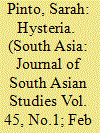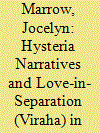| Srl | Item |
| 1 |
ID:
184794


|
|
|
|
|
| Summary/Abstract |
Based upon fieldwork at India’s National Institute of Mental Health and Neurosciences (NIMHANS), I trace the contours of hysteria as an enduring, albeit informal, analytic that continues to disturb neuropsychiatric reductionism within psychiatry. I argue that at this historical moment, the political and economic demand for singular identities out of more porous cultural life-worlds (e.g. ethnic, religious, linguistic, occupational) produces clinical subjects incapable of nuance and flexibility, hastening a host of possessive, literalist, legalist and ‘hysteric’ symptoms that overtake India’s most vulnerable modern subjects, fuelling the sense of a crisis in search of a pharmaceutical solution to a psychopathological diagnosis.
|
|
|
|
|
|
|
|
|
|
|
|
|
|
|
|
| 2 |
ID:
184790


|
|
|
|
|
| Summary/Abstract |
Several anthropological essays in this issue of South Asia, each engaging the figure of hysteria, are reviewed through the relation of phenomena typified as hysterical to accusations of these being counterfeit or ‘duplicate’. A conceptual vocabulary to analyse the essays draws from the author’s work on India’s Aadhaar biometric identification platform as a means to transform a nation into a database and govern through an array of technical practices termed ‘de-duplication’. De-duplication emerges as a useful way to attend to the stakes in the enunciation or refusal of the hysterical symptom.
|
|
|
|
|
|
|
|
|
|
|
|
|
|
|
|
| 3 |
ID:
184791


|
|
|
|
|
| Summary/Abstract |
Ways of mapping mental illness in the world involve stories about history, time and qualities of knowledge. This paper explores the history of hysteria as a South Asian story. With a South Asia-centred history of the contemporary critical concept of cultural translation, this paper observes not only hysteria’s long South Asian history, but the colonial emergence of a defining narrative—the equation of hysteria to spirit possession, a naturalised conceptual arrangement that superimposed upon a long history of medical encounters racialised ideas about epistemological difference.
|
|
|
|
|
|
|
|
|
|
|
|
|
|
|
|
| 4 |
ID:
184793


|
|
|
|
|
| Summary/Abstract |
This article examines first-person narratives of a hysteria-like illness, referred to locally as ‘clenched teeth (daant lag gaya)’. In Varanasi, India, the distinguishing sign of ‘clenched teeth’ is a tightly closed mouth, and symptoms involve seizure-like or fainting behaviours. I show how North Indian women improvised upon expressive genres of love-in-separation (viraha) to narrate their experiences of this illness. Drawing upon the symbolic structure of viraha to explain bodily signs and symptoms, patients of ‘clenched teeth’ asserted they were women who loved so deeply and steadfastly that they could not help but experience distress when separated from the person they adore. Simultaneously, these ad-hoc narratives concealed a traumatic kernel—an unbridgeable asymmetry between the sufferer and her beloved—that rendered the emotion conveyed not only that of love, but also of anger and resentment.
|
|
|
|
|
|
|
|
|
|
|
|
|
|
|
|